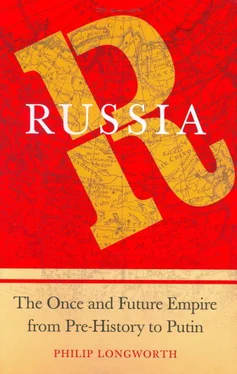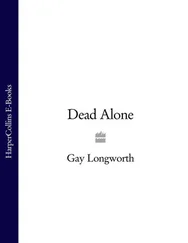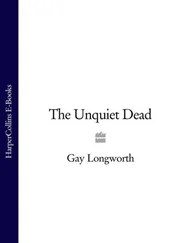The loss of the European satellites had done the Soviet president no good politically, but what really undermined his position were the fast-deteriorating economic and social conditions, and the fact that, to an increasing extent, he was held responsible for the deterioration. The unfortunate public looked about for a figure that might save them and, since Gorbachev had lost credence and most of the other Soviet ministers and officials seemed colourless, Boris Yeltsin became the chief beneficiary of this change of mood. His popularity seemed to be founded less on the ‘liberal’ cause which he espoused than on the fact that he seemed decisive. But other decision-makers believed that the country would be ruined unless strong action was taken urgently.
Gorbachev was on holiday in the Crimea when, on 18 August, an ‘Emergency Committee’ of leading ministers tried to carry out a coup d’etat. Unfortunately for them, the army was divided and, though Gorbachev was placed under house arrest, some KGB and army units ordered to arrest Yeltsin and other oppositionists refused to do so. In the hours of uncertainty that followed Yeltsin rallied the opposition, called for Gorbachev’s release, and posed on a tank for the benefit of the cameras. He was backed by several figures of political substance including the mayor of Leningrad. Together they called for Gorbachev’s restoration. The organizers of the coup might well have prevailed had they been ruthless. But, like Gorbachev himself, most of them shrank from shedding blood. The only fatal casualties were two conspirators, including the Minister of Defence, who committed suicide in the wake of the coup’s failure. At that point no one sought to take the poisoned chalice of the leadership from Gorbachev’s weak grasp. However Yeltsin had used the interregnum and his position of Russian president to suspend the Russian Communist Party and seize its assets. He then stood by like an éminence grise while the tragedy played on to its conclusion
Gorbachev returned to Moscow as a spent force. He joined forces with Yeltsin again, but was now the junior partner. Yeltsin, who held the initiative, would not declare his hand. He denied that he was against the ‘Union of Sovereign States’, whose constitution was being drafted, but as the negotiations over the new form of union continued he did his best to weaken its powers. When Gorbachev offered him the presidency if he backed the project, he demurred; and when a governmental crisis arose in September he pretended to be ill. The republics were demanding ever-increasing expenditure, but on 16 October it was announced that the government was spending twice the amount of its revenue. Next day Ukraine backed out of the proposed economic union and within a week repudiated responsibility for a share in any future Soviet debt. Having refused to agree to a common army, it reinforced its point by withholding food coupons to units which would not take orders from the new Ukrainian Ministry of Defence. Three other republics, of the remaining fourteen, also refused to agree to a common army
Output (GNP) fell by an eighth between mid-January and September 1991. The budget deficit was ballooning, unemployment was soaring, and inflation — which the International Monetary Fund estimated to have reached 150 per cent in 1990 — was rising by 2 or 3 per cent a week. The IMF urged long-term help but the Group of Seven, the world’s richest countries, refused to rush into any rescue plan. Then the Russian government seized the Soviet gold reserves and suspended oil exports. As investors got the scent of another Russian catastrophe, on 15 November 1991 stock-market values round the world plummeted. And, as at moments of national emergency since medieval times, the Patriarch of the Russian Church addressed the Russian people. ‘The old structures have collapsed’, Aleksei II said bleakly, ‘and new ones are not yet in place… People are losing faith in the future and in their political leaders.’
It was a form of political extreme unction, but the death throes of the Soviet Union were not yet quite complete. When Ukraine voted for independence in a referendum held at the beginning of December Yeltsin moved immediately to create an association which would be weaker still. This ‘Commonwealth of Independent States’, centred on Minsk, capital of Belarus, would constitute a single market and co-operate in military matters but have very little real power. However, the Baltic republics and Georgia refused to endorse even this shadow of a union.
Recognizing the failure of his last mission, and the impossibility of his position, Gorbachev went on television a few days later to announce his resignation and a formal end to the entity of which he was president. At midnight on 31 December 1991 the Union of Soviet Socialist Republics, Russia’s fourth empire, would cease to exist. 22He spoke with sadness and with dignity. Not so Boris Yeltsin. He moved into the presidential offices in the Kremlin before Gorbachev had time to clear his desk, and threw a party there.
The end was untidy and brought benefit only to the scavengers of the dead state. Ukraine gained independence but lost the assured Russian market for its grain and coal, on which it had depended. Its huge Russian minority suddenly found themselves in an alien state. Kazakhs formed only 40 per cent of the population of newly independent Kazakhstan; indeed, they barely outnumbered Russians, who formed 38 per cent of its population. 23As the Soviet Union disintegrated there were widespread uncertainties not only about trade and the currency, but about the law and its enforcement, about what was licit and illicit. Lithuania tried to rehabilitate those condemned by Soviet courts for collaboration with the Nazis during the war, only to backtrack when Western countries indicated that this was politically incorrect. Concern spread abroad too — about the repayment of Soviet debt, nuclear proliferation, even about a possible nuclear holocaust.
The Soviet system need not have collapsed so precipitately, nor indeed at all. As Yeltsin subsequently remarked, the Soviet Union could have survived for many years, if not indefinitely. What, then, caused its dramatic collapse? Few of the explanations that were popular at the time hold much credence in retrospect. The Pope’s moral support and diplomacy may have helped speed the break-up of Yugoslavia, but he had little influence in the Soviet Bloc proper outside Poland, Lithuania and western Ukraine. The ‘Star Wars’ project put a strain on the Soviet budget by demanding increased military expenditure for a time but, though debilitating, it was no death blow. There is no evidence to support the idea put about by resentful Communists that the Soviet Union was murdered thanks to a conspiracy by the capitalist West. Nor was nationalism the cause. Nationalism was indeed the banner beneath which several Soviet republics left the Union, yet it turned out to be an excuse for leaving, rather than the cause. The spread of electronic communication may have rendered conventional censorship and political control futile, but only in the long term, and the regime had ceased to be Stalinist in its oppressions long before Gorbachev came to power.
Since the 1960s the Soviet economy had been unable to compete with capitalism. Its inefficiencies had been recognized in Brezhnev’s time, but cautious efforts to improve the system had met with little success. The entrenched interests of the Soviet managerial class, the apparatchiki, obstructed systemic reform. The difficulties attending this option led Gorbachev repeatedly to avoid it and address political reform instead. Yet the people had become disillusioned with democracy even before Gorbachev lost power. Communist China engineered a better solution in the light of his experience. It adopted a mixed economy, part planned, part free, and gave priority to economic, rather than political, reform. That prescription might well have worked in Russia too.
Читать дальше





![Stephan Orth - Behind Putin's Curtain - Friendships and Misadventures Inside Russia [aka Couchsurfing in Russia]](/books/415210/stephan-orth-behind-putin-s-curtain-friendships-a-thumb.webp)





